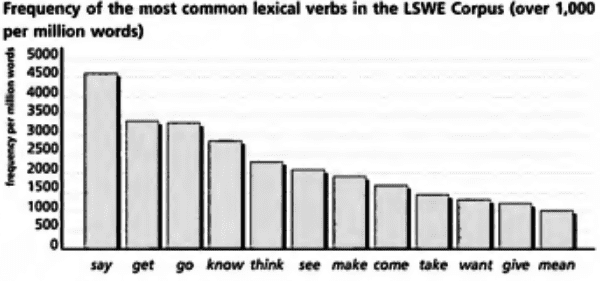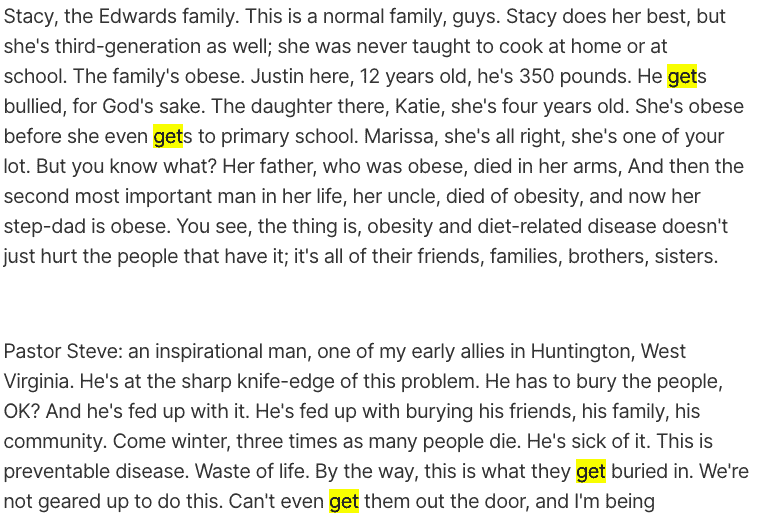Different uses of get
The word get has countless meanings as both a single word and when combined with an adverb or preposition to form phrasal verbs. Moreover, there are tons of other useful collocations with get. With all this in mind, let’s check out the many different uses of get.
EVERYDAY VERBS AND COLLOCATIONS
When I wrote a post proposing model spoken English syllabus for learners at the intermediate level, I drew reference to the Longman Spoken and Written English (LSWE) corpus.
This corpus makes reference to the frequency of the most common lexical verbs in various samples of conversation. Take a look:

Hence, it’s plain to see just how vital it is for progressing learners to pay heed to the sheer versatility of get. Moreover, there are some very good reasons as to why English language learners should learn collocations.
WHAT ARE THE VARIOUS MEANINGS OF GET?
Before we get into all those wonderful phrasal verbs and collocations, let’s check out some of the most common meanings of get:I only asked her to get me some information about the bank
2. receive or be given something
I got a new wallet for my birthday
She got my email yesterday
3. buy something
We need to get some milk on the way home
4. earn / earn an amount of money by selling something
I reckon she gets over £50,000 a year
I can’t get a good price for my summer tires, even though they’re only four months old
5. take a form of public transport
My mum gets the bus to work
Shall we get a taxi to the stadium?
6. understand (a joke or someone’s point etc)
I didn’t get any of her jokes - did you?
7. arrive
What time did you get here last night?
If you get to the pub before us, just wait in the usual place near the pool table
WHEN DOES GET MEAN BECOME?
When considering all of the different uses of get, it’s equivalence to the word become is worthy of a mention.
Get and become are commonly used with the same collocations. Nevertheless, become is more formal and hence more appropriate in written English:
She quit smoking when she got / became pregnant
I’d like to get / become involved in raising money for charity
To achieve the equivalent meaning to become, you may use get with adjectives. For instance, if someone gets cold, they become cold. Other adjectives which follow get include excited, depressed, upset, violent, mad, bored, angry:
There’s no reason to get upset
The kids are getting boredWHEN should YOU USE BECOME AND NOT GET?
Similar to get with adjectives, become takes the meaning of “to change and start to be something different” - but with nouns as well as adjective and noun combinations.
For example:
He became a newspaper journalist after graduating (NOT “he got a journalist”)
She was the first woman to become President
Of course I can become a better teacher
He became a really sad and lonely man after the divorce
COMMON PHRASAL VERBS WITH GET
There are plenty of phrasal verbs with get.
Let’s dive in:
1. get at - try to suggest something without saying it directly
I haven’t got a clue what she’s trying to get at
2. get on with - continue
Please get on with your work - the fun’s over now
3. get out of - avoid doing something you don’t want to do
I’m not able to get out of the meeting
4. get over - recover from an illness
He managed to get over the flu in time for his holiday to Turkey
5. get through - manage to deal with a difficult situation
If I get through the first five minutes of the presentation, I’ll be fine
6. get around - move from place to place
I’ll have to buy a car in Russia to get around
7. get through to someone - make a person understand something
Jonny’s taking drugs again. Jane’s going over next week so I hope she’ll be able to get through to him
_____
On the basis of the example phrasal verbs above, it’s worth pointing out that phrasal verbs tend to carry non-literal meanings. Indeed, in 3 above, I provided a more non-literal use of 'get out of'. However, in a more literal sense, 'get out of' means to exit:
My cousins were smart enough to get themselves out of here before the arguments broke out around the Thanksgiving table.
COMMON COLLOCATIONS WITH GET
Let’s not forget that there are tons of collocations with get. Let’s check some of them out:
1. get a haircut - have your hair cut
It’s about time I got a haircut
2. get a call - receive a call
You should get a call from the Inland Revenue later. They called this morning when you were at the post office
3. get a tan - become brown, or to make someone's body or skin, etc. brown, from being in the sun
I’m not really concerned about getting a tan when I go on holiday
4. get home - arrive home
Call me as soon as you get home
5. get a job
His dream is to get a job at Facebook
6. get drunk - drink too much alcohol so you lose control over normal physical and mental functions
Mike got drunk last night and ended up hitting someone in the pub
7. get married - begin a legal relationship with someone as their husband or wife
They’d like to get married after their child is born
8. get some sleep - to go to bed and sleep
It’s been a long day. I need to get some sleep
9. get dressed - put some clothes on
Get out of bed and get dressed
10. get pregnant - become pregnant
Mary didn’t intend to get pregnant but I think she’s happy she did
ALTERNATIVES TO GET
GO INSTEAD OF GET
When it comes to changes in people’s appearance, physical abilities and personality, use go:
People go bald / grey / blind / deaf / mad / crazy
Use go for sudden, usually negative, changes:
He fell over on stage and went really red
TURN INSTEAD OF GET
Turn often collocates with colours:
The sky turned gold as the sun set
Pick the tomatoes when they turn red
HAVE INSTEAD OF GET
Students of English often mistakenly use get instead of have with certain collocations. However, the following two sentences are correct:
He had a heart attack last year
If I had a child, I’d raise him much differently to the way my parents raised meREAL-LIFE PRACTICE WITH GET
When it comes to exploring the many different uses of get in (natural) context, I recommend intermediate level students to study TED talks.
One of the most attractive features of TED talks for English language learners is the transcripts.
You may home in on collocations which contain a certain word by using your computer’s search box.
Take a look at the range of phrases with get in one small part of Jamie Oliver’s most famous TED talk:

So, we have:
1. get bullied - to be hurt or frightened by someone, often over a period of time
2. get home - arrive home
3. get buried - to bury something means to put it into a hole in the ground and cover it up with earth
4. get someone out the door - physically remove somebody from a room/house etc
THE MANY DIFFERENT USES OF GET
The sheer versatility and ubiquitousness of the word get makes it a topic worth including in every single English language syllabus in schools. Moreover, freelance EFL teachers should draw their students’ attention to get in news articles, TED talks and any other materials.



